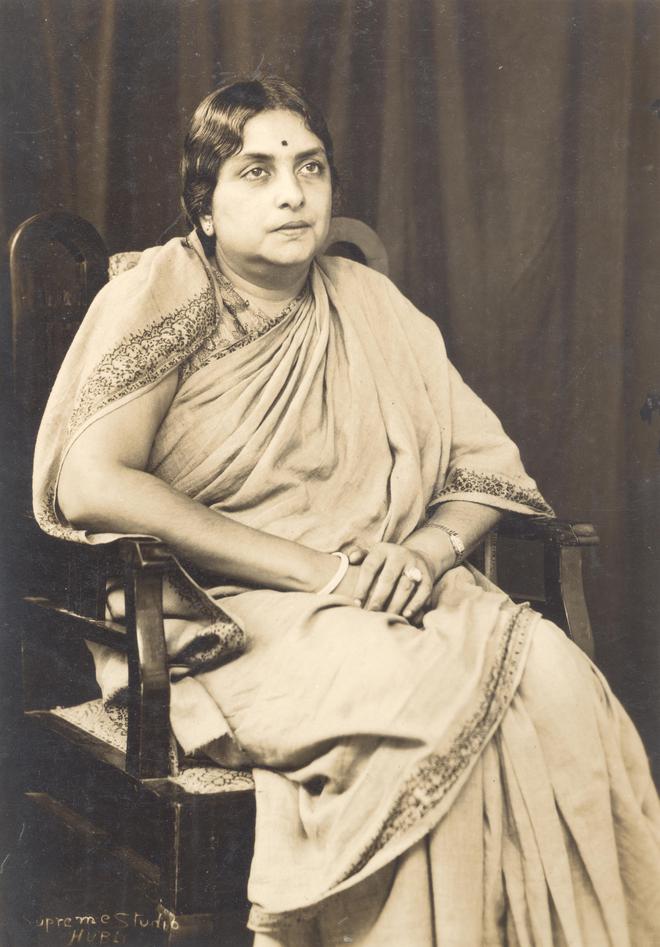
With the recent passage of the women’s reservation Bill by Parliament, it would be interesting to recall the significant role played by pioneering women in the affairs of legislature of Tamil Nadu or the erstwhile Madras Presidency.
In fact, the Madras Legislative Council, as the legislature was called in 1921, at its first session in April that year, adopted a resolution for women franchise. In 1923, women, for the first time, voted for the Legislative Council and the Central Assembly (Parliament), according to B. Ramanathan, professor of history at Presidency College. He recorded this in a special publication brought out in 1997 on the occasion of the platinum jubilee of the Tamil Nadu legislature and the diamond jubilee of the Assembly.
Early advocate of women’s rights
The first woman to contest in an election in the Presidency was Kamaladevi Chattopadhyay (1903-1988), an early advocate of women’s rights. She was a principal figure in the nationalist movement and played a crucial role in bringing back handicrafts, theatre and handlooms to help uplift women. National School of Drama, Sangeet Natak Akademi, Central Cottage Industries Emporium, and the Crafts Council of India owe their existence to her.
Born in Mangaluru, Kamaladevi chose to contest in the November, 1926 election as an Independent in the South Kanara (now called Dakshina Kannada) rural constituency, meant for non-Muslims. Those days, the region was part of the Madras Presidency. But she lost to K.R. Karanth of the Congress by about 500 votes. Perhaps, her defeat had a role in Muthulakshmi Reddy (1886-1968) getting nominated to the Madras Legislative Council. Describing Muthulakshmi’s nomination as a noteworthy feature, a news item published by The Hindu on December 8, 1926, said Kamaladevi had put up a “plucky fight” in the recent election.
When Muthulakshmi, according to a report of The Hindu on December 14, 1926, took oath, she was “lustily cheered” by all present, particularly by the occupants of the women’s gallery. She went on to become the deputy president of the Council and she spearheaded a campaign against the Devadasi system. She introduced a Bill a year later to get the system declared illegal. Even though she did not succeed initially, the legislature adopted a Bill 20 years later.
Ardent Congress member
Rukmini Lakshmipathi (1891-1951) was the first woman to get elected to the legislature of the State (from a general constituency in Chennai in 1937, the year when the State got a bicameral legislature). She went on to become the Deputy Speaker of the Legislative Assembly. She held the post till October 1945. Six months later, she became the first woman Minister of the State when the Congress Ministry, headed by T. Prakasam, was formed. Though she held the portfolio of Health for only about one-and-a-half years, Professor Ramanathan, in his article, attributed the inauguration of maternity centres in villages to her leadership.
An ardent Congress member, she was the first woman to be arrested during the Salt Satyagraha in 1930 at Vedaranyam and awarded one-year simple imprisonment. At the time of Rukmini’s death, K. Kamaraj, Tamil Nadu Congress Committee (TNCC) chief, recalled that as the TNCC vice-president in the “crucial years” of 1942-45, she directed the national movement in the State with “devotion and zeal”.
Jothi Venkatachalam (1917-1992), who became the Prohibition Minister in the Ministry headed by C. Rajagopalachari (Rajaji) in October 1953, was the first woman Minister after Independence. She did not last long as Minister in the first stint. She returned to the Cabinet 10 years later when M. Bakthavatsalam became the Chief Minister. Jothi was made the Minister in charge of public health. She took steps for the eradication of communicable diseases such as smallpox and malaria, Professor Ramanathan said.
First to become Union Minister
When the first DMK Cabinet assumed office in March 1967, Satyavani Muthu (1923-99) became the Minister for Information and Welfare of Harijans (the term used then for the Scheduled Castes). She served as a Minister in the regime headed by M. Karunanidhi, too, till May 1974. She ran a party of her own briefly before joining the AIADMK in 1977. Two years later, when Charan Singh became the Prime Minister, she became the Minister for Social Welfare (August-December 1979), the first woman from Tamil Nadu to hold the Cabinet rank at the Centre.
When AIADMK founder M.G. Ramachandran (MGR) became the Chief Minister in July 1977, P.T. Saraswathi (1935-2009) became the first woman Minister of the party, looking after social welfare. Janaki Ramachandran (1923-1996), who succeeded MGR as the Chief Minister on January 7, 1988, was the first woman to hold the post. Her Ministry was dismissed on January 31 that year. In February 1989, Jayalalithaa (1948-2016) was the first woman to become the Leader of the Opposition in the Assembly. Two years later, she became the Chief Minister for the first time.
During the 2021 Assembly election, nearly 2.32 crore women, about 5.7 lakh more than men, cast their votes. The current legislature has 12 women members. P. Geetha Jeevan and N. Kayalvizhi Selvaraj are the Ministers in the Cabinet headed by M.K. Stalin.







